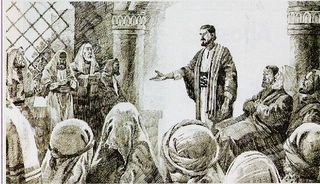Admittedly, family vacation snapshots are not standard fare for a church newsletter. Family photos just don’t mean much to anyone except the family members captured in them. But these snapshots might just be the exception to any such rule. See, our family’s ordinary journey to Indiana and Kentucky in August brought us face to face (literally) with Crane Chapel’s exciting future and it’s esteemed past. After attending a week of classes at FLAME (Fellowship of Leaders Acquiring Ministerial Education) in Frankfort, Indiana, we headed to Zionsville, Indiana to visit Joe and Della Matt along with Dave and Nancy. The Matts really do have a deep love for Crane Chapel and Crane Chapel has a rare appreciation, understanding and respect for the Matt Family. The Matts aren’t just former pastors. The Matts are Crane Chapel’s heritage. The Matt Family has truly influenced generations. And these particular family photos are priceless.
In much the same way, the snapshots of the early Church we’ve been uncovering in the Book of Acts are priceless and designed to instruct and influence generations of Christians. As Christians, these snapshots are our heritage. The Apostle Paul’s Extraordinary Missionary Journeys are no exception; and this is where we’re going next in our Building the Church Series. Paul’s first missionary journey starts in Acts Chapter 13, where we see the first powerful expansion of the Church. Acts 13:49 records, “…the Word of the Lord was being preached throughout the whole region.”
The Apostle Paul’s Missionary Journeys are not just a piece of New Testament history. Paul’s experiences are precious family snapshots. They are reminders that the same things experienced by Paul and his companions will happen wherever and whenever the Gospel is preached.
Our study over the next weeks should spur us to reexamine our own conclusions about what the church is and should be doing. The Church in 2006 – indeed Crane Chapel itself -- retains its legitimacy only in as much as it presents a continuum of the Early Church. The Church in Acts was not stagnant or self-serving. It was not a church gripped with too many details and social concerns. Paul told Timothy: “Preach the Word!” (II Timothy 4:2) This is what Church is all about. Too many modern churches have usurped Christ’s position as head of the Church and have allowed “the way we’ve always done it” or “this is what the community needs” to dictate the future. Let’s allow this study of Paul’s Journeys to really focus the true mission of the Church. These snapshots really are the framework for the Church for every generation.
In much the same way, the snapshots of the early Church we’ve been uncovering in the Book of Acts are priceless and designed to instruct and influence generations of Christians. As Christians, these snapshots are our heritage. The Apostle Paul’s Extraordinary Missionary Journeys are no exception; and this is where we’re going next in our Building the Church Series. Paul’s first missionary journey starts in Acts Chapter 13, where we see the first powerful expansion of the Church. Acts 13:49 records, “…the Word of the Lord was being preached throughout the whole region.”
The Apostle Paul’s Missionary Journeys are not just a piece of New Testament history. Paul’s experiences are precious family snapshots. They are reminders that the same things experienced by Paul and his companions will happen wherever and whenever the Gospel is preached.
Our study over the next weeks should spur us to reexamine our own conclusions about what the church is and should be doing. The Church in 2006 – indeed Crane Chapel itself -- retains its legitimacy only in as much as it presents a continuum of the Early Church. The Church in Acts was not stagnant or self-serving. It was not a church gripped with too many details and social concerns. Paul told Timothy: “Preach the Word!” (II Timothy 4:2) This is what Church is all about. Too many modern churches have usurped Christ’s position as head of the Church and have allowed “the way we’ve always done it” or “this is what the community needs” to dictate the future. Let’s allow this study of Paul’s Journeys to really focus the true mission of the Church. These snapshots really are the framework for the Church for every generation.
- Pastor Mark Goossen





